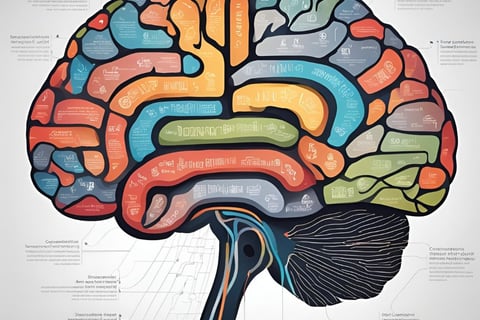Understanding Arrested Development Psychology: A Comprehensive Guide
Arrested development psychology offers valuable insights into why some individuals struggle with maturity and personal growth. By understanding its causes, recognizing the symptoms, and seeking appropriate treatment, individuals can overcome barriers to emotional and intellectual development. Remember, it’s never too late to grow—healing and progress are always possible with the right tools and support.
SELF-HELP
kanav pareek
1/18/20255 min read


Understanding Arrested Development Psychology: A Comprehensive Guide
Arrested development psychology is a term often used to describe a delay or halt in emotional, psychological, or intellectual growth. While it’s not an official diagnosis, it offers a lens to understand why some individuals struggle to mature in certain areas of life. In this blog, we’ll explore the concept, its causes, symptoms, and how it can be addressed for healthier personal growth.
What is Arrested Development Psychology?
Arrested development refers to the halting of normal developmental progress in areas like emotional intelligence, problem-solving, or self-regulation. It might manifest as childlike behaviors, difficulty managing adult responsibilities, or avoiding emotional vulnerability. This condition often stems from traumatic experiences, neglect, or other challenges in formative years.
Key Characteristics:
Stunted emotional responses.
Struggles with maintaining relationships.
Avoidance of responsibilities or decision-making.
A tendency toward escapism.
The Science Behind Arrested Development
How the Brain Develops
The brain’s development is a lifelong process, with significant growth in childhood and adolescence. Regions like the prefrontal cortex, responsible for decision-making and emotional regulation, continue maturing until the mid-20s. Arrested development can interfere with this natural progression.
Impact of Trauma and Environment
Trauma, neglect, or toxic environments during critical developmental periods can alter brain pathways. Adverse Childhood Experiences (ACEs) are particularly linked to disrupted emotional growth, with long-lasting psychological effects.
Causes of Arrested Development Psychology
1. Childhood Trauma
Experiences such as abuse, neglect, or witnessing violence can freeze emotional growth, as the brain shifts focus to survival rather than exploration and learning.
2. Overprotective Parenting
Excessive control or coddling can prevent a child from developing problem-solving skills and independence.
3. Mental Health Disorders
Conditions like anxiety, depression, or personality disorders can inhibit emotional and social development.
4. Addiction and Substance Abuse
Chronic substance abuse can impair cognitive functions and delay emotional maturity.
5. Socioeconomic Challenges
Poverty, lack of access to education, or unstable living conditions may limit opportunities for intellectual and emotional growth.
Symptoms of Arrested Development
Recognizing the symptoms is crucial to understanding and addressing the issue. These include:
Emotional Symptoms
Difficulty processing emotions.
Overreaction to minor setbacks.
Fear of rejection or criticism.
Behavioral Symptoms
Avoidance of responsibilities.
Over-dependence on others.
Childlike interests or hobbies as escapism.
Cognitive Symptoms
Limited problem-solving skills.
Black-and-white thinking.
Inability to learn from past mistakes.
Impact on Relationships and Daily Life
Relationships
People with arrested development may struggle to maintain healthy relationships. Emotional immaturity can lead to conflicts, miscommunication, and difficulty handling intimacy.
Career and Responsibilities
Professional growth can be hindered by a lack of discipline, fear of challenges, or difficulty managing time effectively.
Diagnosis: Can Arrested Development Be Identified?
Though not a clinical diagnosis, professionals often identify patterns of arrested development through:
Psychological assessments.
Analysis of personal and family history.
Observation of emotional and behavioral patterns.
Effective Treatments for Arrested Development Psychology
1. Psychotherapy
Cognitive Behavioral Therapy (CBT): Helps reshape negative thought patterns.
Trauma Therapy: Addresses underlying traumatic experiences.
Dialectical Behavior Therapy (DBT): Teaches emotional regulation and coping skills.
2. Emotional Growth Programs
Workshops and group therapy sessions can provide tools for building emotional resilience and self-awareness.
3. Medication
For co-existing mental health conditions like anxiety or depression, medication can aid in emotional stability.
4. Support Systems
Family therapy, support groups, or mentoring relationships encourage healthy interactions and provide accountability.
Self-Help Strategies for Overcoming Arrested Development
1. Build Emotional Intelligence
Practice mindfulness to stay present.
Engage in journaling to process emotions.
2. Develop Healthy Habits
Prioritize sleep, nutrition, and exercise.
Limit substance use and escapist behaviors.
3. Face Challenges Head-On
Set small, achievable goals.
Step out of your comfort zone regularly.
4. Seek Feedback
Constructive criticism from trusted individuals can guide personal growth.
Preventing Arrested Development: Early Interventions
1. Nurturing Parenting Styles
Encouraging independence while providing support lays the foundation for healthy growth.
2. Trauma-Informed Care
Early intervention for trauma can prevent long-term emotional stagnation.
3. Positive Reinforcement
Celebrating small achievements fosters confidence and a growth mindset.
When to Seek Professional Help
If symptoms of arrested development interfere significantly with daily life, relationships, or work, it’s time to consult a licensed therapist or psychologist. Early intervention is key to unlocking long-term growth and potential.
1. “The Body Keeps the Score” by Bessel van der Kolk
Why It’s a Must-Read:
This seminal book delves into the long-term effects of trauma on the body and mind. Bessel van der Kolk explores how unresolved trauma can lead to arrested development, preventing individuals from progressing emotionally and psychologically. The book is comprehensive yet accessible, making it a favorite among both professionals and laypeople.
2. “Complex PTSD: From Surviving to Thriving” by Pete Walker
Why You’ll Love It:
For anyone grappling with the consequences of childhood trauma, this book is a beacon of hope. Pete Walker explains how adverse experiences can arrest psychological growth and offers strategies to foster healing and personal growth. It’s especially beneficial for those dealing with complex post-traumatic stress disorder.
3. “Adult Children of Emotionally Immature Parents” by Lindsay C. Gibson
Key Takeaways:
Gibson sheds light on how emotionally immature parents can contribute to arrested development in their children. This book is an eye-opener for anyone seeking to break free from cycles of dysfunction and reclaim their emotional independence.
4. “Healing the Shame That Binds You” by John Bradshaw
How It Helps:
Shame is a core emotion that often underpins arrested development. John Bradshaw’s work provides a framework for understanding and overcoming toxic shame, empowering readers to achieve emotional liberation and growth.
5. “The Drama of the Gifted Child” by Alice Miller
Why Read This Classic:
Alice Miller explores how unmet childhood needs can halt emotional growth. Her insights are invaluable for those looking to understand the root causes of their struggles and take actionable steps toward healing.
6. “Boundaries: When to Say Yes, How to Say No” by Dr. Henry Cloud and Dr. John Townsend
Practical Applications:
Developing healthy boundaries is critical for overcoming arrested development. This book offers a step-by-step guide to building boundaries that support personal growth and emotional maturity.
7. “Reinventing Your Life” by Jeffrey E. Young and Janet S. Klosko
Why It’s Transformative:
Focused on breaking negative life patterns, this book addresses schemas that may arise from arrested development. It provides tools to reprogram harmful behaviors and beliefs, paving the way for healthier, more fulfilling lives.
8. “Attachment Theory: A Guide to Strengthening the Relationships in Your Life” by Thais Gibson
What You’ll Learn:
Attachment styles play a significant role in arrested development. This book explores how attachment impacts our emotional and psychological growth, offering actionable advice to improve relationships and personal resilience.
9. “Parenting from the Inside Out” by Daniel J. Siegel and Mary Hartzell
For Parents and Individuals:
Understanding the interplay between your upbringing and current emotional challenges can help in overcoming arrested development. This book is especially useful for parents aiming to foster emotional growth in their children.
10. “Man’s Search for Meaning” by Viktor E. Frankl
Timeless Wisdom:
While not specifically about arrested development, this classic provides profound insights into overcoming adversity and finding purpose, both of which are essential for emotional and psychological growth.
Conclusion
Arrested development psychology offers valuable insights into why some individuals struggle with maturity and personal growth. By understanding its causes, recognizing the symptoms, and seeking appropriate treatment, individuals can overcome barriers to emotional and intellectual development. Remember, it’s never too late to grow—healing and progress are always possible with the right tools and support.
FAQs
1. Can arrested development be reversed?
Yes, with therapy and support, individuals can overcome the effects of arrested development and foster personal growth.
2. Is arrested development a mental health disorder?
No, it’s not a formal diagnosis but rather a concept used to explain stunted growth in specific areas.
3. How can parents help prevent arrested development in children?
Parents can provide a safe, nurturing environment, encourage independence, and address challenges early.
4. Are there specific therapies for arrested development?
Yes, approaches like trauma therapy, CBT, and DBT are effective in addressing underlying issues.
5. Can arrested development affect adults only?
While it’s commonly identified in adults, the roots often trace back to childhood experiences.


Blog
Content
Engage
contact@growthtimewithme.com
© 2024. All rights reserved.
